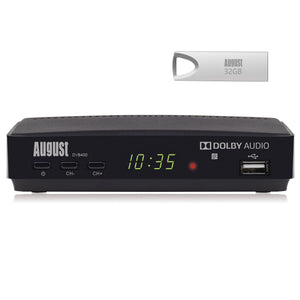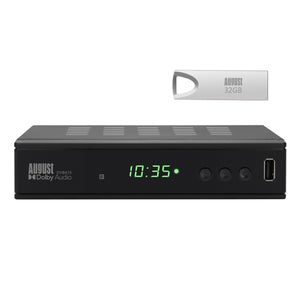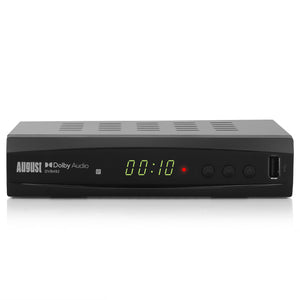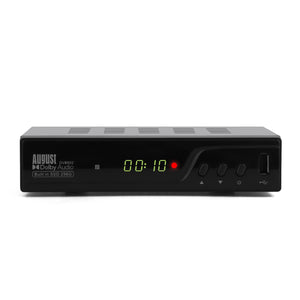UPDATED JUNE 2024
With the release of "Freely" as yet another alternative to Live TV, it has been added to the list of alternatives. It doesn't really devalue a Freeview box yet, though, since Freely comes with a fraction of the channels, requires powerful internet, and still relies on a backup aerial anyway...
We've come a long way from the days when a fourth channel on the TV was a big deal. The biggest change of the last few decades of television has certainly been the "Digital Switchover", in which old "analogue" TV stations were replaced with digital signalling distributed to what would be called "Freeview Boxes".
With the digital switchover now 12 years behind us, is the tech holding up? And what price is terrestrial TV really worth anymore? Let's find out:
How Much is a Freeview Box?
To make a proper stab at how good Freeview boxes are (and will be ten years from now...) we'll have to compare their price to some of the alternatives. We're going to assume that if you don't get TV content through a Freeview box you're probably relying on streaming or DVDs, which incur their own costs.
On average, a Freeview box that can record TV will set you back between £40 and £90, with more expensive boxes boasting dual-tuners, larger storage, programmable remotes and more.
If you want the bare minimum i.e. a box that can decode Freeview and display it, then they can go as low as £30! But most of us want to at least record one channel, if not two, and then it's a snowball upwards into the £50+ range.
So how much a Freeview box is really depends on what you want to use it for. You don't buy an F1 car if all you need to do is go to the shop.
If you want it for a kitchen TV unit or a bedroom TV then they can be cheaper, but if you want to outfit your main TV in the living room you'll probably opt for the more pricey versions.
One thing remains the same, however, and that is the fact you only pay once...
Freeview Boxes vs Streaming vs Hard Copies
When considering how worth it Freeview boxes are, we have to look at the alternatives.
1) Freeview Boxes
A Freeview box entails a 1-time cost of between £40 and £90, plus the "TV Licence" if you're in the UK. This is an extra £159 a year. The only recurring cost is that TV Licence, so an average of £13.25 a month since Freeview is, as the name implies, free.
In terms of "hidden" costs and pre-requisites, you need an aerial and a coaxial cable. That'll set you back maximum £150 (if you have no aerial on the roof and 0 wiring) and is again a one-time purchase.
2) Streaming
I wish I could give a concrete price, but it's honestly difficult to judge. Let's assume you want to cover all the core entertainment services and channels. That'll be £159 for the TV Licence, as you need one for iPlayer. Netflix is £95 a year on the "middle" plan. Disney Plus (which gives us all the American shows from Star, too) is another £79.90. Those three cover a majority of content, with the rest of the British broadcasts being free or included.
You also have to consider that the pre-requisites are more expensive. A solid internet connection can cost between £25 and £45 a month, adding even more to the cost.
3) Physical Media
If you are opting to watch your content without a Freeview box or streaming, then physical media is the last resort. DVD Box sets are still a thing, but more and more get "collector" prices. The fact that so many of us moved online has made physical media a "hobby", which can inflate the price. Also, physical media allows you to ignore subscriptions, signal reception, internet connection and all of that. You own that box set and can watch it as long as you live.
You also don't have to pay the £159 TV Licence.
However, if we assume you want to watch a comparable amount to a Freeview box over the year, the cost will be high. One box set can cost £15.00 for a one-off series like last year's Great Expectations on Freeview for example. Add in all the shows you could have simply recorded with a Freeview box and the price will rise to meet that £159 pretty quick. Consider that you might even be buying Blu Ray and that could be £50+ a Box Set.
4) Freely Internet TV
As of May 2024, a new option has presented itself. Rather than using a Freeview box to access terrestrial Freeview, you can adopt the brand-new initiative from Everyone TV (owners of Freeview) which uses internet connectivity to deliver live TV. The idea is you skip needing an aerial, and can run a real live EPG off of your broadband.
However, Freely, despite the name, has a larger initial cost than Freeview! Freely is only available on specific brand-partner TV's and only 2024 models. This means you're looking at £800+ to get a compatible TV. Then you need the broadband to run it, which can set you back anywhere between £25 and £60 a month. The real kicker is that once you do that, you still only get 30 channels on that Freely EPG compared to over 100 on Freeview.
So, for now, Freely doesn't shake up the validity of Freeview boxes in 2024 due to the excessive adoption cost and limited availability.
Future-Proof Investment?
It's clear that the recurring costs of both physical and streamed media are going to add-up. However, they will also persist. Something that leaves Freeview boxes in doubt is the fact we have no confirmation that they will work beyond 2034, the final date for Freeview to be officially supported in the UK...
2034 is still the better part of a decade away, so it doesn't really affect your purchasing decision right now this second, but in time Freeview Boxes may become less and less valuable as a second "digital switchover", but this time to Internet TV, grows closer and more feasible.
If you have a working DVD player and a DVD, you keep your media. However, if you're subscribed to an Internet TV service already, you could find content is suddenly missing from your library! Learn about the darker side of streaming content (and how you are being cheated out of shows!).
Are Freeview Boxes Worth It?
Overall, a Freeview box, and especially one which records to SSD storage, is still the cheapest and easiest way to access hours and hours of TV and film. For minimal cost and no recurring charges you can access, record, and rewatch content all year round.
Obviously, you have more access to international content with streaming, but you pay for it, literally. With monthly subscriptions piling up and the internet stability in your area suddenly becoming the catalyst for you watching TV, it can be far more reliable to just get a set top box.
If you really don't watch all that much TV and just want to catch up on the biggest shows of the year then physical media and a DVD player is probably unironically the best bet for you. You save on the TV licence, and you only need to get 5 - 6 box sets or films a year to keep on top of the biggest releases. But Freeview boxes do provide more than just TV and film, since they have radio reception and multimedia playback built-in more often than not. This makes physical media a little more expensive for a little less choice, overall.
Minimise Pre-Requisite and Entry Costs






Thank you for really helpful explanation of options